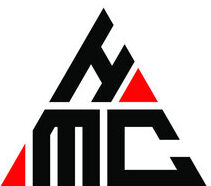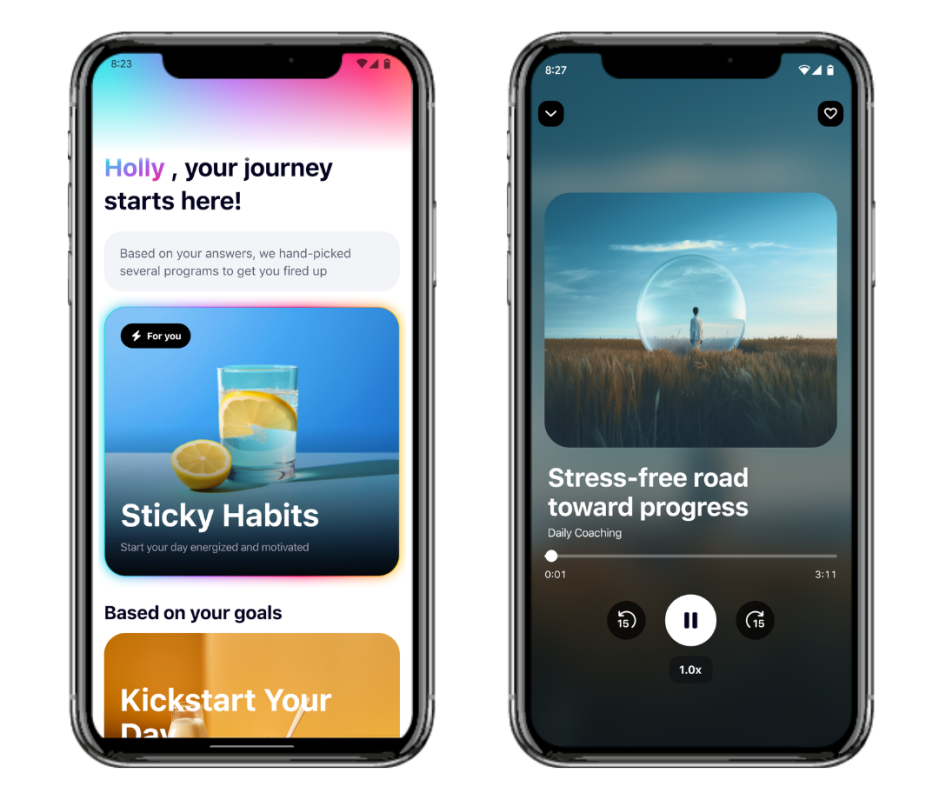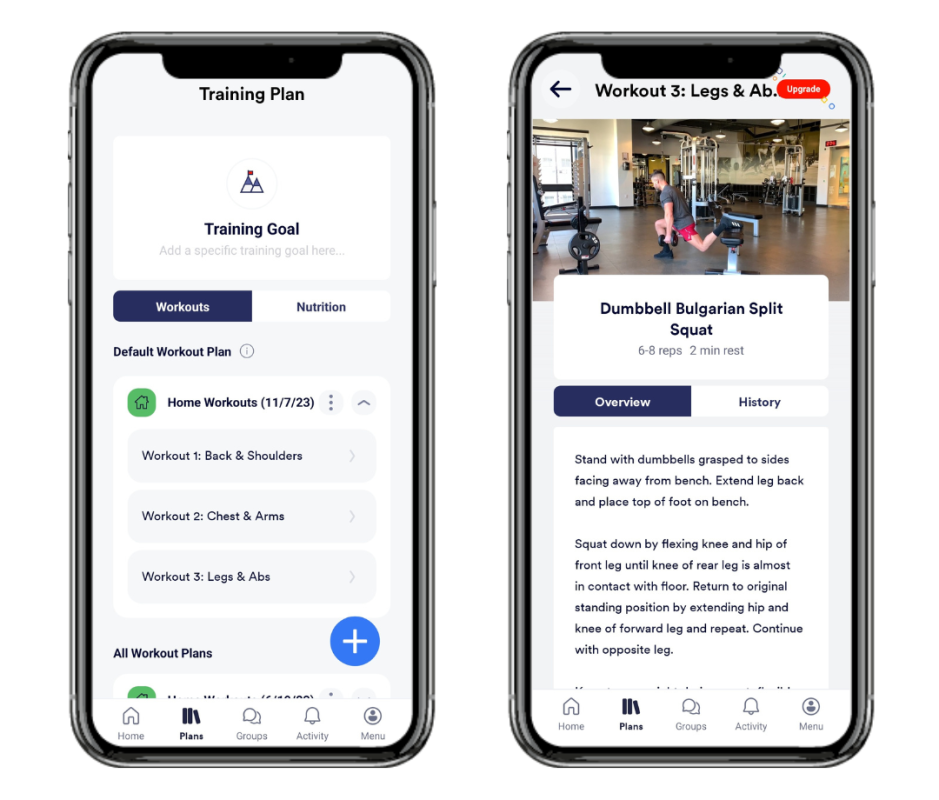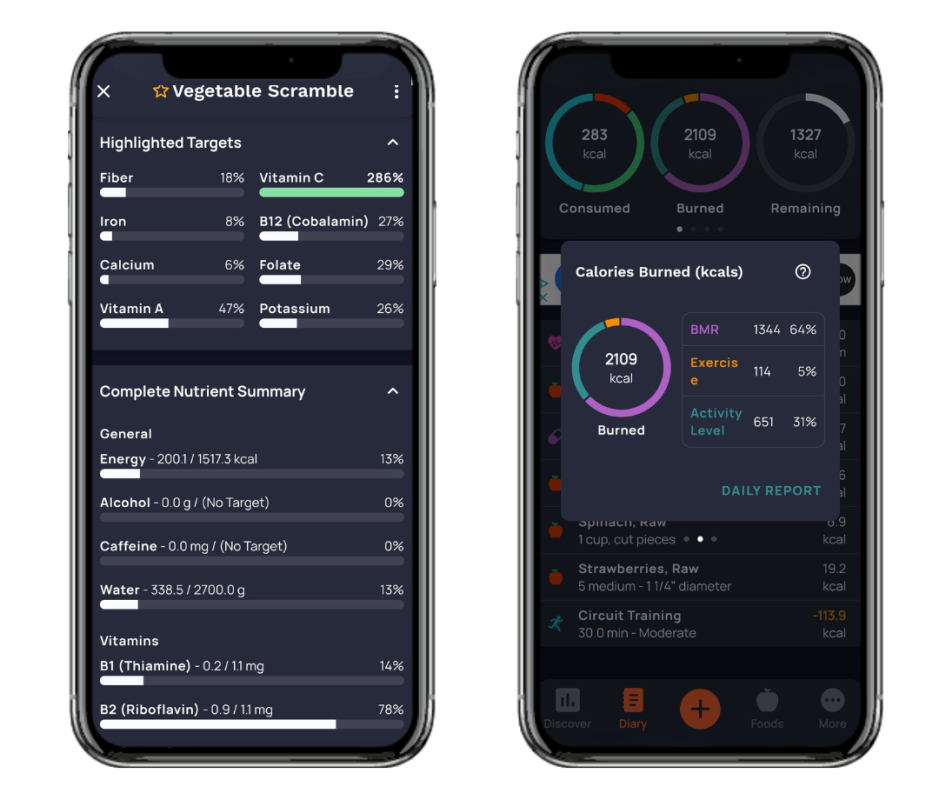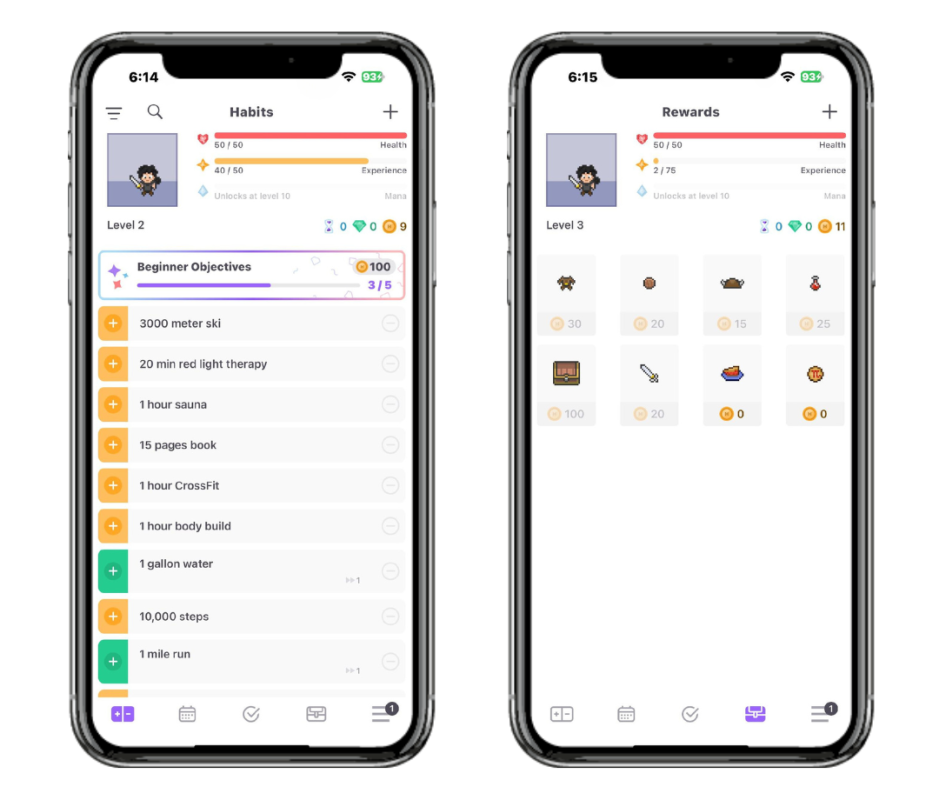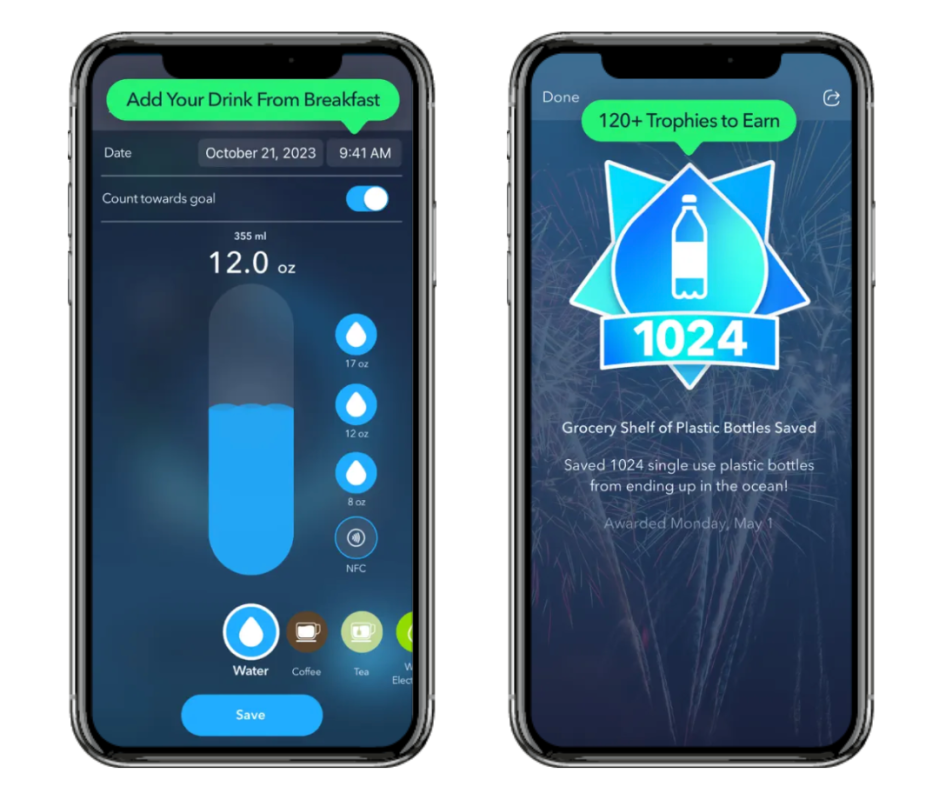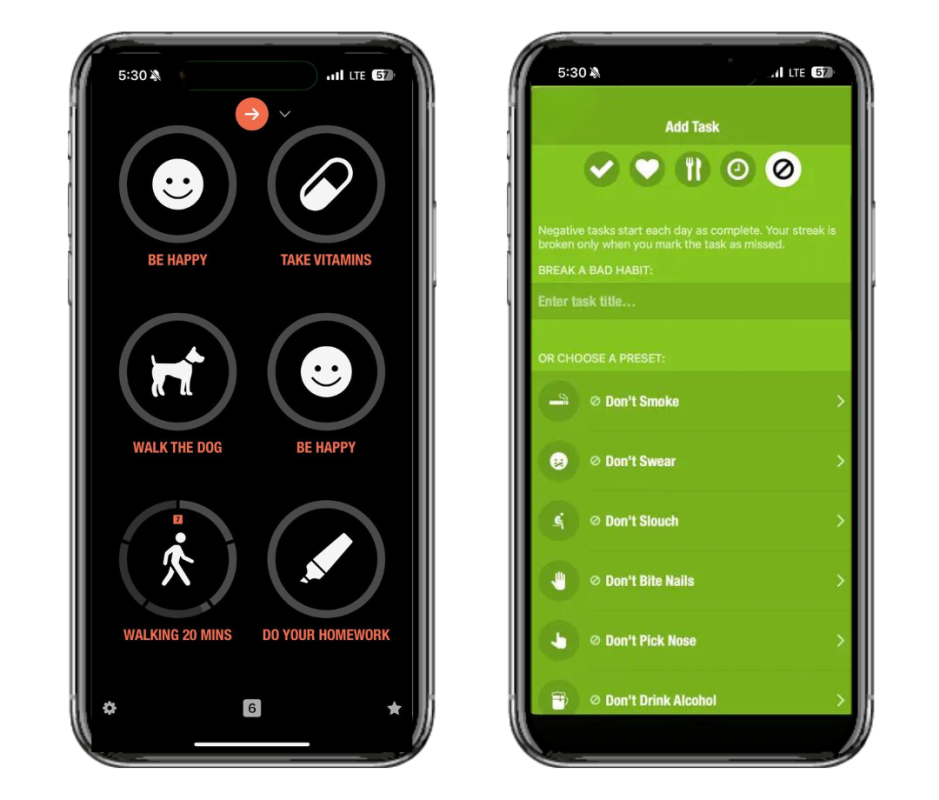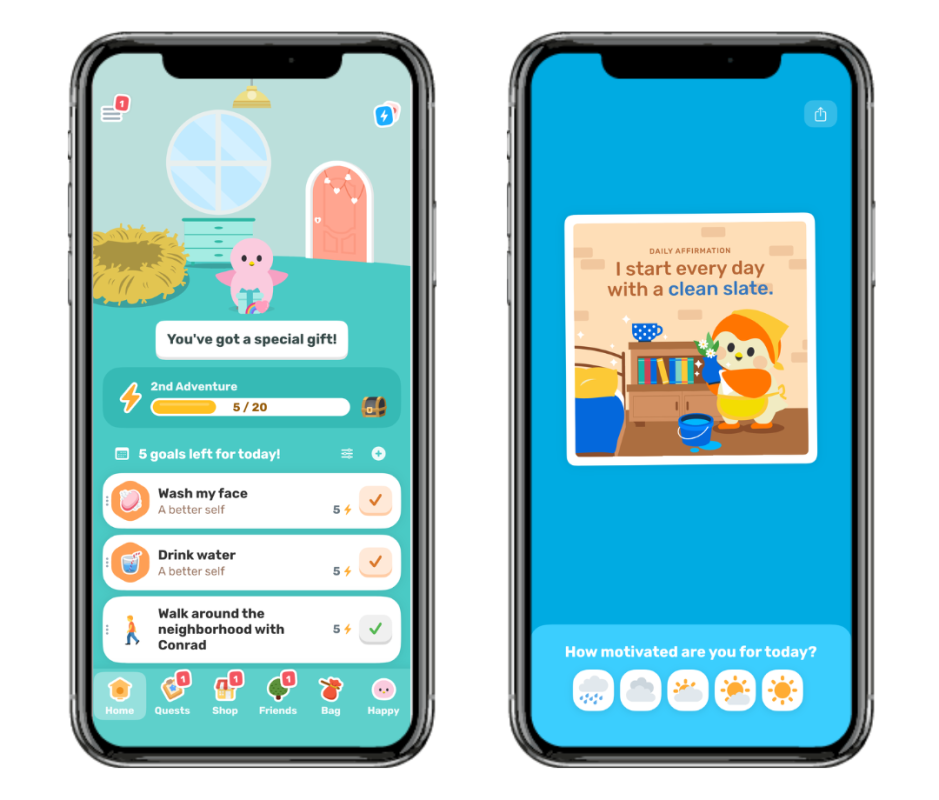Men’s Journal aims to feature only the best products and services. If you buy something via one of our links, we may earn a commission. The products featured here have been independently reviewed by the Pillar4 editorial team, and this article has been edited and published by Men’s Journal. Learn more here.
Courtesy Images
Whether you want to eat healthier, exercise more, stop smoking, or regularly take time for mindful moments, finding the motivation to create or break habits is not always easy. You can make a big difference by taking small steps and being consistent. Habit-tracking apps help you do both. These apps keep you organized and on top of your goals. “Tracking habits allows you to notice the small wins. It can be motivating when an individual starts to see the streaks, and by doing that, the behavior leads the way to the results you’re hoping for,” says Tami Best, R.D.N. and Integrative and Functional Nutrition Dietitian with over 15 years of counseling experience.
Fortunately, apps come with a wide variety of features that help them fit various lifestyle needs and goals. Whether you prefer a simple habit tracker, need the accountability of one-on-one coaching, or prefer gamification to make daily tasks a little more fun, there’s a habit-tracking app for just about everyone. Our expert team has tested over 30 health and fitness apps, including the seven best habit tracker apps, to help you find the one that’s right for you.
Our Picks for the Best Habit Tracker Apps of 2024:
- Best Overarching Habit Tracker: Greatness
- Best Habit Tracker for Exercise: Caliber
- Best Habit Tracker for Healthy Eating: Cronometer
- Best Gamified Habit Tracker: Habitica
- Best Habit Tracker to Stay Hydrated: HidrateSpark
- Best Habit Tracker for iPhone: Streaks
- Best Habit Tracker for Self-Care: Finch
Best Overarching Habit Tracker: Greatness
Courtesy Images
At a Glance:
- Habits tracked: Work-life balance, productivity, purpose and motivation, relationships, organizational skills, physical activity and exercise, healthy eating, self-love, improved sleep, relieving stress
- Free trial: Yes, one week
- Subscription cost: $49.99–$79.99 for a 12-month subscription
- Ratings: 3.7/5 (Google Play), 4.3/5 (iOS App Store)
- Syncs with wearable devices? No
Why We Picked It:
Greatness is a habit-builder that guides you through small steps to create habits that help you focus on specific goals. Your Greatness journey starts with a questionnaire about your daily routine, including sleep habits, fitness, eating, and self-talk habits. Holly Brown, CrossFit Level 1 Coach, says she tried the app to find her weaknesses in maintaining good habits so she could work on improving them. “I think it does a decent job of keeping me accountable and providing education and videos to learn more about each habit I’m tracking. I’m currently tracking several habits, including planning my meals and taking ten deep breaths periodically throughout the day.”
The programs include essential habits and audio courses to add to your daily routine. “You can choose the time of day and/or how often you complete the habit. You swipe right when you’re done, and the app checks it off a list in a satisfying way,” Brown says. “It does a good job of making you feel accomplished after ticking off each habit on your list.”
I tried the “Sticky Habits” program, which is designed to help you start your day energized and motivated. The program covers four essential habits, including avoiding the snooze button, drinking a glass of water, eating a healthy breakfast, and stretching, and gives you a little research behind each. Before you begin, Greatness shares how the program works and what to do if you encounter any setbacks. Next, you make a pact that affirms what you will complete and why. You should turn on notifications to allow the app to guide you through your commitment. For instance, my first “habit” was to drink a glass of water. Once you’ve completed the task, you can select whether you have completed it or skipped the habit.
Greatness programs focus on small steps, which means you add habits slowly. You have to complete a habit for several days in a row before any new tasks. “There are habit options designed for many different outcomes, including relationship health, mental health, sleep, and exercise. There were a few options that didn’t apply to me, but it’s easy to unselect these and choose the ones you want to focus on,” Brown says.
Pros
- Broad range of program options to help you find one that fits your goals
- Checking things off your list feels super satisfying
- App provides small, manageable steps and audio guidance to motivate you
- You choose when to complete each habit
- Expert behavioral scientists develop programs
Cons
- App doesn’t allow you to change the pace, and you must add habits slowly
- Weight loss, sleep, and water trackers aren’t available yet (but the brand says they’re coming soon)
Best Habit Tracker for Exercise: Caliber
Courtesy Images
At a Glance:
- Habits tracked: Workout progress tracking, personal bests, nutrition tracking (via Cronometer connection)
- Free trial: No
- Subscription cost: Caliber Pro is $19 monthly, $49 for three months, or $169 annually. Premium coaching starts at $200/month, and a free version is available
- Ratings: 4.8/5 (Google Play), 4.9/5 (iOS App Store)
- Syncs with wearable devices? Yes, it syncs with popular devices, including Apple Watch and Fitbit
Why We Picked It:
Caliber is a highly personalized workout app that creates a training plan based on your exercise goals with progress, metrics, and nutrition tracking. While many apps on this list provide general activity tracking, Caliber is the only app that generates specific strength training exercises for you. There is a free version and two paid options: Caliber Pro and Caliber Premium (there’s also a paid option known as Caliber Supporter, where super-fans can pay more to support the app in return for a Supporter badge on their profile and no coaching pop-ups.). Rachael Gonzalez, C.P.T., C.S.C.S., uses the free version. “Caliber is a strength-focused app, but I use the custom workout feature to track my running,” she says. “The interface is simple and intuitive, and it’s easy to create and track workout plans. Unlike other free apps, it doesn’t bog me down with ads.”
The Pro and Premium versions offer coaching if you want more accountability, guidance, and support in following your exercise routine. Caliber Pro has four distinct groups with members who share the same fitness levels and goals. After choosing a group, you’ll gain access to a team of expert coaches who provide workout plans, supplement guidance, and nutrition advice. Coaches and group members interact with each other for daily motivation and support.
Caliber Premium is a one-on-one coaching option where you work with an expert coach to set and track your goals. Your coach helps you build habits with customized programs designed just for you, and you can communicate with messaging, pictures, and videos. “I message my coach at different times throughout the day and always get a response within four to five hours, and my coach followed up several times throughout the week,” says tester Cory Kessler, C.P.T., C.N.C. Kessler has been using the Premium version for a month and says there is a lot of daily input, including weigh-ins, exercise tracking, and nutrition tracking (which is done in a separate app, Cronometer; the data then syncs to Caliber). “The metrics I track are great for straightforward goals such as losing weight or gaining muscle,” Kessler says. “I wouldn’t recommend Caliber for tracking abstract goals like mobility or endurance training. It can’t accommodate the metrics required to track that.”
Kessler says Caliber promotes healthy training habits and helps you avoid bad habits and body shaming. He missed a few training sessions to see how his coach would react. “My coach isn’t pushy at all, but he has held me accountable in a professional, positive way when checking in on the days I’ve missed.”
Pros
- Tracking is straightforward, and workouts have detailed explanations with helpful videos
- Customized one-on-one or group coaching options with a trained fitness professional
- Syncs with major fitness trackers
- Options for different budgets, including an ad-free version at no cost
Cons
- One-on-one coaching is expensive, starting at $200 per month
- Only tracks exercise and nutrition habits
Best Habit Tracker for Healthy Eating: Cronometer
Courtesy Images
At a Glance:
- Habits tracked: Food diary, meal planning, fitness stats, nutritional intake, weight, fasting, custom biometrics (menstrual cycle, body measurements, headaches, bowel movements), mood, sleep
- Free trial: No
- Subscription cost: Paid version is $9.99/month or $54.99 annually, free version is available
- Ratings: 4.7/5 (Google Play), 4.8/5 (iOS App Store)
- Syncs with wearable devices? Yes, Apple Health, Google Fit, Samsung, Oura, WHOOP, Fitbit, Garmin, Polar, Strava, Suunto, Withings
Why We Picked It:
Cronometer is an excellent option for those who want an in-depth look at what they eat to build nutritional awareness, portion control, and other behavioral insights that lead to healthier habits. The free version provides a food diary and meal plan, targeted goal tracking, and the ability to log biometrics to track nutrition meticulously. Cronometer Gold is the paid version of the app, and it offers users more insights and tracking options outside of nutrition, such as body measurements, blood pressure, energy level, mood, sleep, and more. The app then uses the info you put in to generate data charts monitoring how changing daily habits impact these metrics. The paid version is ad-free, so there are no distractions or interruptions.
Erin Chancer, C.N.C., C.P.T., says the meal tracker is straightforward and provides a super detailed nutrition breakdown, but other tracking features, such as mood or sleep score, are generic. “You have to enter numeric values to track mood, sleep, and other metrics, so I rate them on a scale from one to five,” she says. “You can track so much, which is good, but may be overwhelming for some users.”
Cronometer provides an impressively comprehensive database of foods and their macronutrients and micronutrients. This information comes from reputable sources like the United States Department of Agriculture (USDA) National Nutrient Database and the University of Minnesota’s Nutrition Coordinating Center Food & Nutrient Database (NCCDB), to name a few, so users have access to accurate information. You can see charts and graphs of your complete nutrient summary, from how much alcohol, caffeine, and water you consume to your breakdown of vitamins, minerals, proteins, fats, and carbs. You can also chart your daily calorie intake and weight.
Chancer says the home screen provides a detailed breakdown of charts and reports. Subscribers can add customized charts, and users of the free habit tracker are limited to a visual with the calories and macronutrients consumed and a weight log. Whether you opt for the free or paid version, anything you track goes into your daily diary. Cronometer offers push notifications to remind you to track.
Pros
- Lots of tracking options available with the free version of the app
- Sharing data with your coach or nutritionist is easy
- Comprehensive database of nutritional data
- App syncs with wearables for better tracking
Cons
- Tracking is so detailed that it can be overwhelming
- Free version shows ads, and some features are only available with the paid version
- No community aspect or chat functionality
Best Gamified Habit Tracker: Habitica
Courtesy Images
At a Glance:
- Habits tracked: Any; you choose what to add
- Free trial: No, but there is a free version available
- Subscription cost: $4.99/month, $14.99/three months, $29.99/six months, or $47.99/year
- Ratings: 4.8/5 (Google Play), 4.0/5 (iOS App Store)
- Syncs with wearable devices? Yes, Android WearOS devices
Why We Picked It:
Habitica makes accomplishing daily habits a little more exciting by turning your to-do list into an RPG (role-playing game), complete with retro pixel art graphics. The app launched in 2011 and has over a million downloads. Though gamers may particularly appreciate this app, you don’t have to be one to enjoy it. You track habits, daily tasks, and to-dos. Habits can be positive, like “20 minutes of red light therapy,” or negative, so you work on bad habits such as doom scrolling. Daily tasks are ones you repeat on a regular basis, like watering plants, and to-dos are tasks you only need to do once, such as scheduling an appointment.
Alen Kunica, an active member and owner of The Den, tried the app for over two weeks. “I enjoy upgrading my weapons and potions and having a game element included in my daily habits. It reminds me of games I played when I was younger and brings me joy in accomplishing my daily goals,” he says. “Advancing to the next level and upgrading my equipment has most reflectively encouraged me to keep up with tracking.”
Kunica says figuring out how to use Habitica took some time and effort. “It could use a tutorial to help get you started and learn how to participate in the game. It would also help to know where the game is going and what I’m trying to accomplish.” He wishes there was a more game-like element to tracking habits besides earning gold to buy equipment or customize the avatar. “I would like upgrading weapons or potions to have more of an effect on mastering the game.” The rewards are available for different prices and are reminiscent of prizes in a typical RPG game, such as swords, armor, potions, and other fantasy-world objects.
Pros
- Gamification makes completing tasks more fun, and rewards offer incentive
- You can access this app on your phone and desktop computer
- Community aspect of the app for greater accountability
Cons
- There’s a lot to learn, which can be confusing initially
- You can buy prizes with real money, which may take away from the purpose of earning rewards for completing tasks manually
Best Habit Tracker to Stay Hydrated: HidrateSpark
Courtesy Images
At a Glance:
- Habits tracked: Hydration goals, including daily and hourly goals, streaks, and total liquid volume consumed. You can also track the type of beverages you drink
- Free trial: No
- Subscription cost: $1.99/month or $14.99/year, free version is available
- Ratings: 4.2/5 (Google Play), 4.5/5 (iOS App Store)
- Syncs with wearable devices? Yes, Apple Health, Fitbit, Google Fit, Apple Watch, Garmin Connect, Health Mate, and Under Armor Record
Why We Picked It:
HidrateSpark is an app that pairs with the brand’s smart water bottle or tumbler to track your water intake and is ideal for those who solely want to work on drinking more water. The smart water bottle must be purchased separately and costs between $64.99 and $79.99, depending on the size you choose. The four bottle sizes range from 17 to 32 ounces, all with leakproof lids. If you prefer a tumbler, there is one 20-ounce option.
A smart sensor is on the bottom to track your sips and send your data via Bluetooth to the HidrateSpark companion app. The HidrateSpark app tracks the total liquid volume you consume, including different types of beverages. It has daily and hourly goals and streaks, so you can see how many days you’ve been tracking in a row.
Kayla Godfrey, an avid weightlifter and sports enthusiast, has used HidrateSpark for over four years. “I struggle with drinking water and need an extra reminder to motivate me to get it done. I got this smart water bottle because of its functionality and how beautiful it is,” she says. The bottles come in four color choices, Black, Deep Blue, Sea Glass, and Fruit Punch, with a sensor at the base that glows when you need to drink. You can customize the glow color, pattern, and frequency. “The reminders and the light help me stay on track for my goal,” she says.
The HidrateSpark team worked with doctors and nephrologists to create the equation that calculates the recommended goals. The app considers your height, weight, activity level, and even the weather where you are to determine how much water you should drink each day. Once you’ve entered your data, HidrateSpark formulates your suggested daily intake, or you can select your goal amount. It can sync to fitness apps to incorporate exercise activity when making suggestions. However, it can be a little glitchy—Godfrey says her app doesn’t always sync to her Apple Watch. “I don’t have my phone while working, but I always have my watch on. If I leave the room where my bottle is, it would be nice to have the watch notify me.”
Pros
- Godfrey says the light and reminders help her stay on track
- Puck sensor tracks how much you drink without having to enter anything manually
- Tracks over 40 different drink types
- “Find my bottle” feature helps you locate your bottle
Cons
- Not a good option for those who want to track other habits
- You can’t use the app without the compatible water bottle, and our tester says there are syncing issues
- Bottle sensor needs charged daily
Best Habit Tracker for iPhone: Streaks
Courtesy Images
At a Glance:
- Habits tracked: Positive, negative, and timed tasks
- Free trial: No
- Subscription cost: $5.99/year
- Ratings: 4.8/5 (iOS App Store), not available on Google Play
- Syncs with wearable devices? Yes, Apple Watch and Apple Vision Pro
Why We Picked It:
When forming new habits, it’s important to be consistent; this is where Streaks can help. This Apple Design Award-winning health app helps you maintain aspects of your routine, including positive habits you want to nurture, habits you want to break, and even timed habits. For example, maybe you want to take your vitamins daily, go for a walk three times a week, drink more water, or practice an instrument for ten minutes every day. On the other hand, maybe you have some habits you want to quit, like smoking or biting your nails. The app allows you to select from a library of suggestions or to add your own tasks. Your objective is to maintain your streak for each task; if you miss one day, you start over from zero.
Kandace Bailey, avid CrossFitter and active mom of two, uses Streaks to track habits for a 75 Hard challenge—a 75-day program that requires following five daily routines involving exercise, diet, drinking water, reading, and taking progress photos. “I like that I can make a structured list of my daily tasks; it helps me track my habits for the challenge,” she says. “It’s flexible, so I can add custom habits like taking my magnesium supplement every night or walking for 20 minutes daily.” You can choose when to complete the task and set up notifications to remind you. Bailey says there is a slight learning curve, which was initially overwhelming. “The app was confusing for me and had a lot going on. There are multiple home pages where you can add different tasks, and the color options are a lot. I wish it were simplified more.”
Once you complete a task, you simply hold down the icon for the task until a check appears to mark it off your list. Quickly tap the icon to see your habit streaks, including your success rate percentage for accomplishing the task weekly and monthly. This data helps you see your progress and accomplishments, so you can focus on consistency.
Pros
- Budget-friendly
- Structured list of daily tasks makes tracking easy
- Tracks habit metrics, including number of streaks completed, best streak success rate percentage, and more
- Lots of tasks to choose from, and users can create custom tasks
Cons
- Some people may feel discouraged if they break a streak
- You don’t have the option to track unlimited habits and can only track 24 tasks at a time
Best Habit Tracker for Self-Care: Finch
Courtesy Images
At a Glance:
- Habits tracked: Self-care. The app provides options to track and improve gratitude, anxiety, energy, confidence, tidiness, better sleep, mood, movement, mindfulness, and relationships
- Free trial: Yes, one-week
- Subscription cost: $39.99/year, free version is available
- Ratings: 4.9/5 (Google Play), 4.9/5 (iOS App Store)
- Syncs with wearable devices? No
Why We Picked It:
Finch is a gamified self-care habit-tracking app that is gentle and intuitive. The creators developed the app to help make self-care tasks a little easier to keep up with, even in times when you’re dealing with challenges like anxiety and depression—conditions both founders struggle with. Unlike other apps on this list, the suggested tasks strongly focus on self-care and mental health, and you track these habits with the help of your Finch, a sweet cartoon bird widget.
You can choose from the app’s suggestions or add custom tasks. Finch’s suggestions include mindful goals and exercises like walking for an afternoon reset and completing acts of kindness. There are guided journey options with daily tasks such as quests to improve focus, feel more optimistic through gratitude, manage anxiety, and boost energy. After setting up your goals, you choose how often you want your monthly habits to repeat and set reminders.
Periodically, when you open the app, you’ll get daily affirmations and inspirational quotes. As you complete your goals, you’ll earn rainbow stones you can use to buy things for your finch, like new clothing items and decorations for their homes. Along the way, your finch reaches milestones like evolving from a baby to a toddler. After using the app for a month, Godfrey says she has tried new self-care habits. “I like the little journeys I can send my finch on. They help me learn or do things for myself I wouldn’t typically take time to do. It’s a great way to explore self-care and be more mindful of how you accomplish your habits rather than just checking off a box.”
Another fun aspect of the app is adding friends; your finches can interact and cheer each other on. “I had my husband sign up, and we would send little nudges back and forth,” Godfrey says. The app offers a lot—maybe even a little too much, Godfrey says. “It can be a little overwhelming at times. There are so many different aspects and things to do with your finch,” says Godfrey.
I’ve been using this app daily while writing this article, and I love how calming and easy it is. The graphics are creative and cute, and there’s much to discover on the app. Godfrey says taking care of her finch makes it more fun. “It might seem silly, but the little bird is so cute, and you want to take care of it. Taking care of my finch takes care of me, and it’s easier to focus on my goals.”
Pros
- Testers say the app is visually engaging and fun
- You can customize your goals or choose from the app’s suggestions
- Community aspect of the app helps with accountability
Cons
- Cutesy graphics and gamification may not be for everyone
- It doesn’t connect to wearables
What Is Habit Tracking?
Habits are routine behaviors repeated on a regular basis. They are created by repeating behaviors in specific contexts, where actions become automatic responses to situational cues because you’ve learned to connect those things with what you do.
You need to repeat a specific action consistently to form a habit. One way to do this is by habit tracking, which usually involves recording your tasks and measuring your results. Annie Chen, a Board Certified Behavior Analyst, says tracking habits is as easy as using an app or writing a list on paper. “As a behavior scientist, I always tell my clients that tracking your habits is collecting data.”
What Are the Benefits of Habit Tracking?
Habit tracking helps you log your tasks and goals to work toward self-improvement. By collecting data, you can better understand how your daily actions affect your life and where you can make small gains or take setbacks more easily. Benefits of habit-tracking apps include:
- Accountability
- Motivation
- Visualization of small wins and streaks
- Sense of accomplishment
- Task planning and goal setting
- Self-evaluation
Intrinsic vs. Extrinsic Motivation
Chen says intrinsic motivation focuses on pursuing goals and habits based on your internal “why” and the values important to you. Extrinsic motivation comes from external pressure, such as the influence of a family member. “[Extrinsic motivations], to me, aren’t quite as powerful,” she says. “They’re very temporary measures, which means you might be motivated for a little bit, and then you’ll back off and give up hope and motivation very quickly. I always recommend pursuing behavior change and habits intrinsically.”
Best says self-accountability is an excellent motivator because you feel like you’re in control of your decisions. “I think accountability is invaluable when somebody’s trying to create new habits.”
How to Choose the Best Habit Tracker App for You
Consider Your Goals
Habit-tracking apps such as Greatness, Habitica, Finch, and Streaks focus on general or specific goals, and other apps track particular habits. For instance, HidrateSpark monitors hydration, Caliber tracks fitness and nutrition, and Cronometer is geared toward tracking nutrition and biometrics.
Accountability
Each app has its own way of holding you accountable. Examples include gamified accountability, accountability through working with a coach, or accountability through the app’s community of users. Goal-setting features give users a target to work toward, and regular reminders prompt them to perform their desired habits at specific times and intervals. Many habit-tracking apps offer data analysis to provide insights into habits and progress to help users identify trends, patterns, and areas for improvement.
Types of Habits Tracked
The apps on this list can track any habit you can think of, whether you want to nurture healthy habits or break bad ones. Some of the more popular habits featured in these apps include fitness, nutrition, hydration, sleep, self-care, and tidiness. Many apps allow you to add any habit you want to track to your to-do list rather than solely offering pre-set habits.
Ease of Use
Some habit-tracking apps are simple and have intuitive functionality, while others have a learning curve that may take time to figure out. The amount of time and patience it takes to learn an app varies by person. Each app on this list has a support section as a resource, and apps like Caliber, Cronometer, and Habitica have in-app hints to help users.
Cost
Some apps offer free or budget-friendly options, while others are pricier. For example, Cronometer has a great free app version that provides access to most of its features. Streaks is budget-friendly at only $5.99 per year, and Caliber has a free version, but the premium version is more expensive, starting at $200/month for one-on-one coaching. As you consider your budget, think about the most essential features and decide if it is worth paying for them or if you could get the same results with a free habit tracker.
Who Should Avoid Habit Tracker Apps
Those who struggle with trauma and perfectionism might be triggered by habit tracker apps, especially if they miss a day or mess up a streak, Chen says. “That could make it worse because all they’re focusing on is, I didn’t do this, I didn’t do that, and that’s not going to help. It could cause them to fall back, focus more on the failure piece, and lose motivation.”
How We Tested and Reviewed Each Habit Tracker App
We tested and chose products for our list of the best habit tracker apps based on several factors. These include:
- Tracking capacity and effectiveness: Does the app provide something unique or especially valuable to the user? Is the app motivating, and does it effectively measure results?
- User experience: Does the app work well, and is it easy to navigate?
- Value: Is the app reasonably priced for what it offers?
- Syncing/integration: Does the app sync to wearables and other devices? Can you use it on multiple devices, such as your iOS or Android smartphone, iPad, Mac desktop, Apple Watch, and more?
- Goal setting and progress tracking: What types of goals can the app track, and what measurements for monitoring are available?
Why You Should Trust Us
Our team of health and wellness experts spent considerable time researching the habit-tracking apps included in this article and used these apps for durations spanning from two weeks to over a year. We considered which aspects we like and what could be improved to enhance the user experience. We also spoke to behavioral experts Annie Chen, a Board Certified Behavior Analyst, and Tami Best, R.D.N., to gain specialized knowledge about great habit tracking.
Best Habit Tracker App FAQs
How Long Does It Take to Break a Habit?
Best says the time it takes to break a habit is very individualized. “It depends on where people are in terms of their readiness to change, how long it’s going to take for them to get the habit in place, and if they have assistance or support.”
How Many Days Does It Take To Make It a Habit?
Studies have shown habit formation ranges from 18 to 254 days, and this variability makes it difficult to set expectations for how long it takes to form a healthy habit. “We all operate differently; the barriers we struggle with, our past experiences, and our histories all play a part in that timeline,” Chen says. “It depends on the person and why they want to shift their habits or behaviors.”
What Is the Difference Between Setting a Goal and Creating a Habit?
When you set a goal, you create an objective for specific results you want to accomplish. Habits can help you achieve goals, but they repeat consistently. For example, if you aim to eat more fruit, eating a piece for breakfast supports that goal. “A habit requires consistency and is something we might implement daily, regularly,” says Chen.
How Do I Overcome Lack of Motivation to Exercise?
Best suggests starting small regarding lack of motivation for exercise and anchoring your habit to something you already do, such as squatting every time you stand up to get more coffee. “The power of the social environment can be huge for people when it comes to motivation for exercise too,” she says.
How Can I Get in the Habit of Drinking Water?
“Anchor it to an existing behavior that happens consistently in your daily routine,” says Best. For example, every time you have a meal or snack, make a habit of drinking a glass of water beforehand. HidrateSpark is a water bottle with a tracking app to help you get into the habit of drinking water by sending reminders and measuring your daily hydration.
The Takeaway: Is a Habit Tracker App Right for You?
If establishing good habits or breaking bad ones is challenging, the right habit tracker app could be the way to break through. These apps allow you to set goals and track progress. This data provides insights into things that are working and where to make improvements. Many offer education modules to learn more about building healthy habits and encouragement and positive reinforcement to help you achieve your goals.
